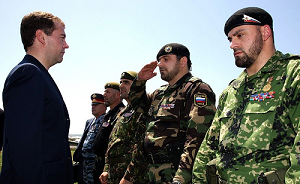Ingush Police to support Chechen Units in Syria
By Huseyn Aliyev
April 26, 2017, the CACI Analyst
A 300-strong battalion of Ingush military police, assembled from among Ingush Special Forces, was dispatched to Syria in February as announced by the head of the Ingush Republic Yunus-bek Yevkurov. According to the Russian Ministry of Defence, Ingush soldiers will replace Chechen military police sent to support pro-Assad forces in and around Aleppo in December 2016. However, in a recent statement, Chechen security officials confirmed that the Chechen units would most likely remain in Aleppo until August 2017. As ceasefire violations between pro-Assad forces and the Syrian opposition become more frequent, reinforcements from Ingushetia may indicate Russia’s intentions to increase its ground troops in Syria.

Is China about to make military moves in Central Asia?
By Stephen Blank
May 9th, 2016, The CACI Analyst
China has steadfastly refused to get involved in providing hard, i.e. military, security to Central Asian governments, including Afghanistan. This might now be changing. In a March visit to Kabul, General Fang Fenghui, Chief of Staff of the PLA, announced plans to set up an anti-terror regional alliance with Pakistan, Afghanistan, and Tajikistan. President Ashraf Ghani of Afghanistan reportedly endorsed this proposal. China’s initiative could imply a major new development in Chinese policy and in Central Asia’s overall security, with lasting implications for the region.
Azerbaijan and the Syrian anti-terror coalition
By Zaur Shiriyev
April 12th, 2016, The CACI Analyst
Saudi Arabia’s attempt to persuade Azerbaijan to join its anti-terror coalition comprised of Islamic countries has created problems for Baku due to fierce opposition to this coalition from Iran and Russia. Azerbaijan’s leadership subsequently attended the international donor conference on Syria’s future, seeking to become part of an international platform that will limit the country’s involvement to humanitarian affairs. However, while Azerbaijan’s interests and capacity to engage in international discussions about Syria are limited, the involvement of Azerbaijani fighters in the terrorist organization calling itself the Islamic State (ISIS) may require Baku to join some kind of international anti-terrorism coalition in the future, aimed at supporting intelligence sharing and cooperation with the aim of preventing recruitment of Azerbaijani jihadists.
Russia's new gambit: sharing intelligence with the Taliban
By Stephen Blank
March 15th, 2016, The CACI Analyst
For years, Moscow has fulminated against the Taliban as a terrorist force that represented a threat not only to Afghanistan’s security but also to Central Asia and even to Russia itself. Yet news surfaced in December that Russia is sharing intelligence with the Taliban and apparently has been in discussions with it since 2013. According to U.S. intelligence sources, these discussions have also been accompanied by weapons transfers. Thus, while Russia is constantly, along with Central Asian leaders, playing up the ISIS threat and selling weapons to the Afghan government, it also shares intelligence and possibly sells weapons to its Taliban adversaries. These contradictions expose some of the problems in Russia’s regional policies in Central Asia and in its approach to terrorism.






